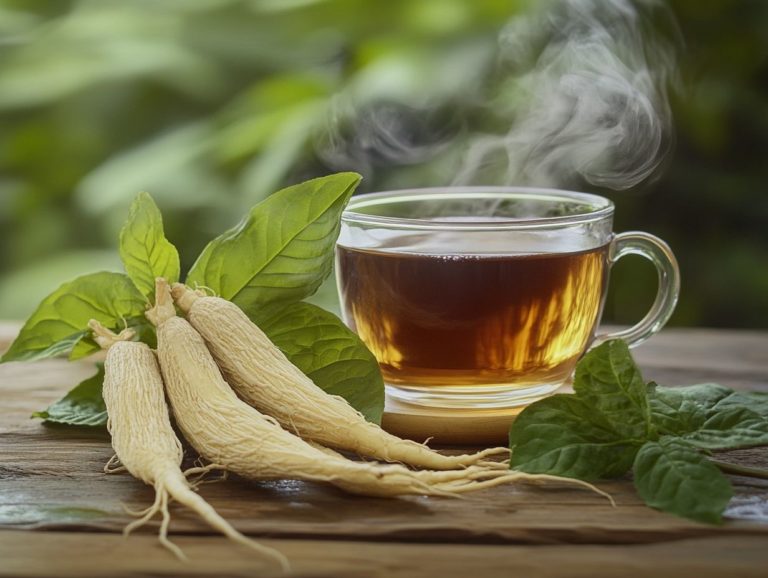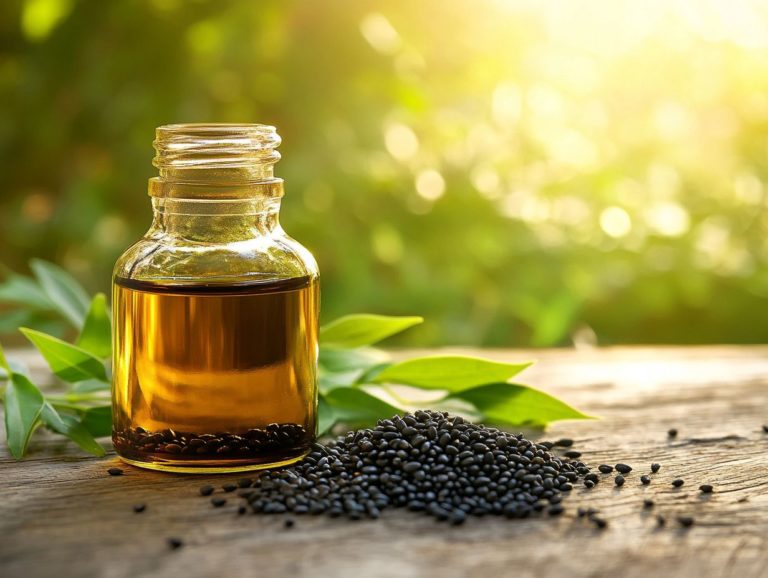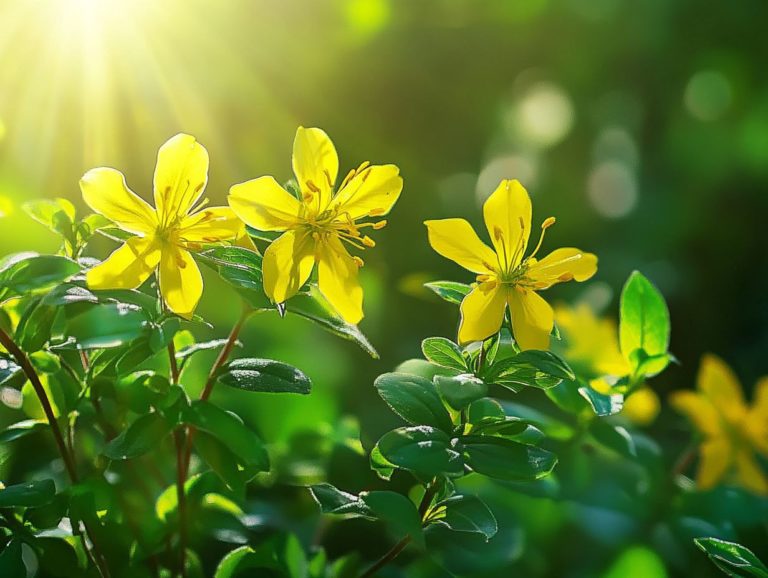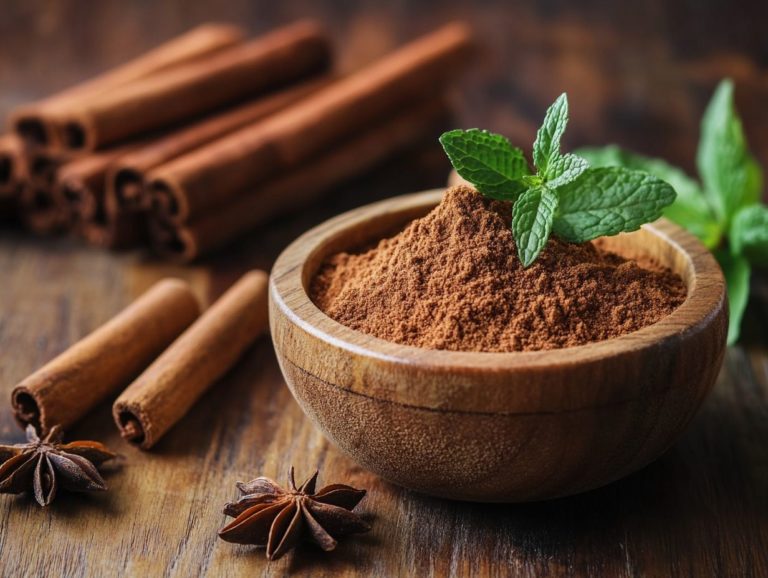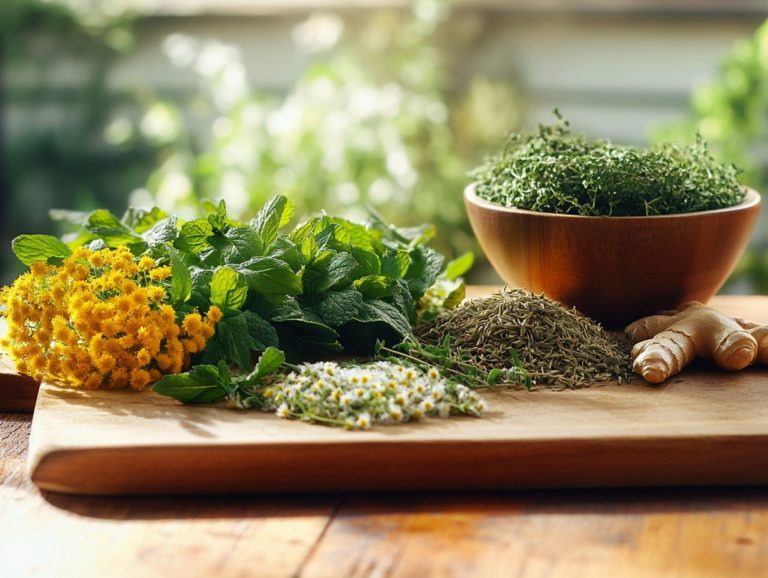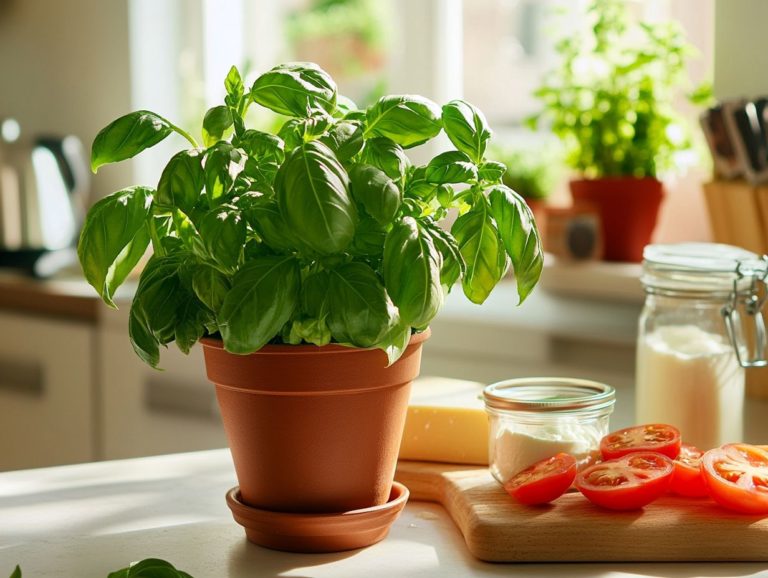Herbs for Stress Relief: Top Picks
In today s fast-paced world, stress can feel like an unwelcome companion shadowing your every move. You ll be thrilled to know that nature offers powerful herbal remedies ready to help you restore balance and tranquility.
This article delves into 15 powerful herbs celebrated for their stress-relieving properties, from the soothing embrace of lavender to the gentle calm of chamomile. It explores how stress impacts your body, the various forms of herbal remedies available, and practical ways to weave them into your daily routine. It also highlights potential risks you should keep in mind.
Discover how these natural allies can empower you to reclaim your peace of mind.
Contents
- Key Takeaways:
- 1. Lavender
- 2. Chamomile
- 3. Ashwagandha
- 4. Lemon Balm
- 5. Passionflower
- 6. Valerian Root
- 7. Rhodiola Rosea
- 8. Holy Basil
- 9. Kava
- 10. St. John’s Wort
- 11. Ginseng
- 12. Ginkgo Biloba
- 13. Skullcap
- 14. Gotu Kola
- 15. Reishi Mushroom
- What Is Stress and How Does It Affect the Body?
- Frequently Asked Questions
- What are the top herbs for stress relief?
- How can ashwagandha help with stress relief?
- What is passionflower and how does it benefit stress relief?
- Can chamomile really help with stress relief?
- What are the benefits of using lemon balm for stress relief?
- Are there any potential side effects of using herbs for stress relief?
Key Takeaways:
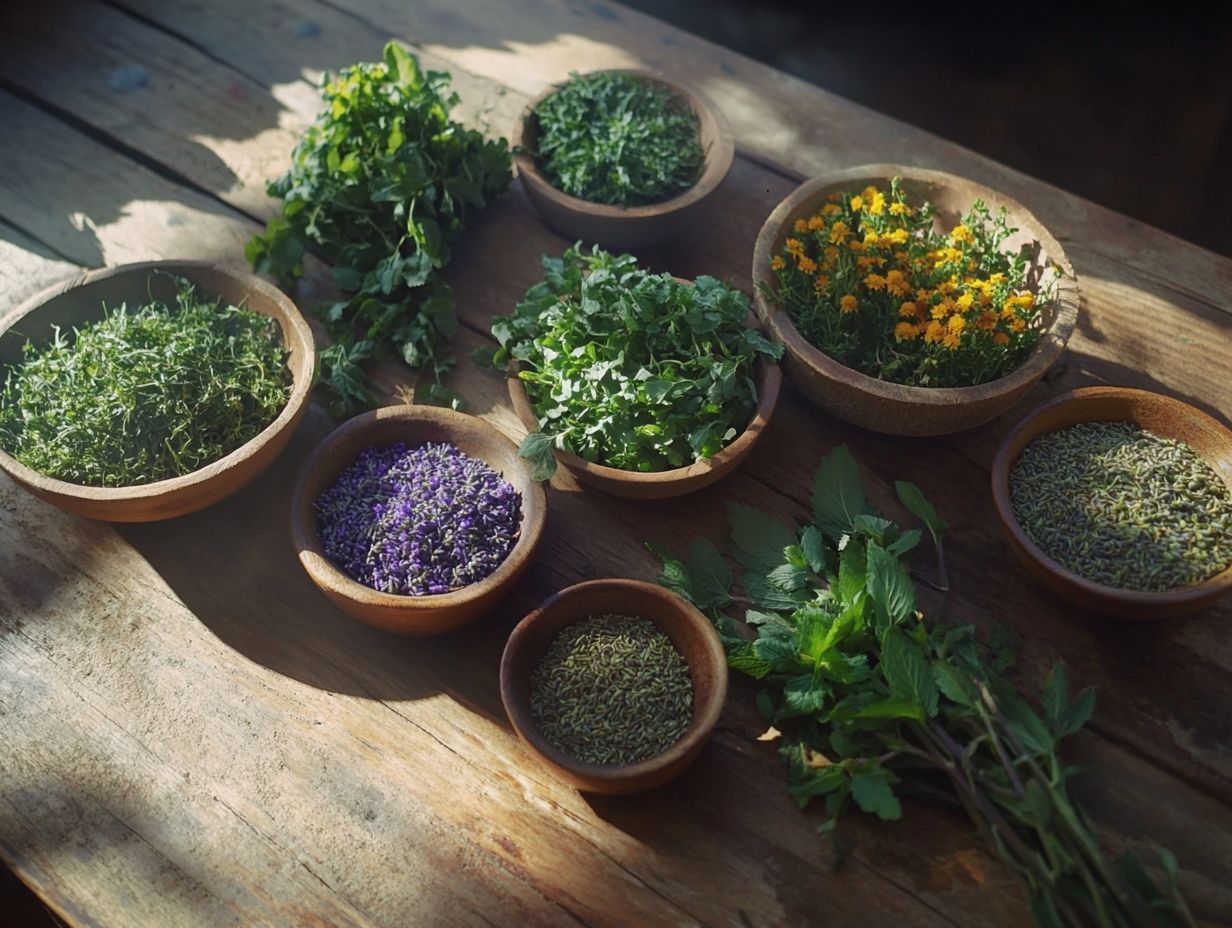
- Lavender, chamomile, and Ashwagandha are top picks for stress relief due to their calming and relaxing properties.
- Herbs can help manage stress by reducing cortisol levels and promoting relaxation in the mind and body.
- Incorporating herbs into daily routines through teas, supplements, or aromatherapy can be effective in managing stress, but it is important to consult a healthcare professional and be aware of potential risks and side effects.
1. Lavender
Lavender, a revered herb celebrated for its soothing properties, has garnered attention in the world of herbal supplements for its potential to alleviate anxiety disorders and provide emotional support. This interest spans healthcare professionals and researchers at the National Institute of Mental Health.
The magic lies in its active ingredients, particularly linalool and linalyl acetate. These compounds are believed to be key players in its calming effects. Research studies have shown that they can help ease anxiety symptoms by modulating neurotransmitters and encouraging relaxation. For example, a clinical trial published in a top-tier journal highlighted a significant reduction in anxiety levels among participants using lavender oil compared to those receiving a placebo.
While lavender is generally deemed safe, be aware of potential side effects like mild gastrointestinal discomfort or allergic reactions. If you’re considering weaving lavender into your wellness routine, using essential oils in aromatherapy or sipping on herbal teas could be gentle alternatives to conventional medications. Just remember to consult with a healthcare provider before embarking on any new treatment.
2. Chamomile
Chamomile is widely recognized as a powerful herbal remedy, often found in wellness and dietary supplements for its calming effects. It can help alleviate anxiety and promote relaxation.
This gentle herb, celebrated for its soothing properties, contains active ingredients like apigenin and bisabolol. These ingredients work with brain receptors to bring calm and alleviate feelings of unease. Many individuals discover that incorporating chamomile into their daily routine can lead to more restful sleep and reduced stress levels.
It’s essential to be aware of safety concerns. Consult a healthcare professional before adding chamomile to your treatment plan, especially if you are pregnant, nursing, or have underlying health conditions. This ensures that you approach anxiety management safely and informed.
3. Ashwagandha
Ashwagandha, a stress-relieving herb, is celebrated in the realm of herbal supplements for its remarkable ability to lower stress hormone levels and enhance overall mental health. This makes it an appealing natural alternative, particularly when paired with cognitive behavioral therapy a type of therapy that helps manage anxiety by changing negative thought patterns.
This powerful herb boasts essential bioactive compounds, including withanolides, believed to contribute significantly to its stress-reducing and mood-boosting effects. Regular supplementation can lead to impressive reductions in cortisol levels, alleviating anxiety and fostering a sense of well-being.
While Ashwagandha is generally regarded as safe for most individuals, be mindful of side effects such as digestive upset and drowsiness, particularly at higher dosages. Standard recommendations suggest a daily intake of 300 to 600 mg of a standardized extract. However, it s wise to consult with a healthcare provider before initiating any regimen.
Try incorporating one of these herbs into your daily routine today and experience the tranquility for yourself!
4. Lemon Balm
Want to explore natural solutions for your anxiety? Lemon Balm, a gem in the mint family, has long been celebrated as an herbal remedy for anxiety disorders. It s particularly valued for its ability to offer emotional support and promote relaxation, especially when quality testing confirms its potency.
This soothing herb primarily exerts its calming effects through active compounds like rosmarinic acid and flavonoids, which have demonstrated notable anxiety-relieving effects. Research studies, including rigorous double-blind, placebo-controlled trials, provide compelling evidence of its effectiveness in reducing anxiety symptoms. Participants have shown significant improvements in mood and stress levels, especially when using top herbs for managing stress effectively.
The role of third-party testing is crucial this process guarantees that the product is free from contaminants and verifies the concentration of active ingredients. This ensures that you receive a reliable and safe solution when pursuing natural anxiety relief.
5. Passionflower
Passionflower is gaining recognition as a go-to herbal supplement for its soothing effects on anxiety symptoms. It is becoming increasingly popular among those seeking effective dietary support for emotional well-being.
This extraordinary plant houses various active compounds, including flavonoids, glycosides, and alkaloids, which collaborate beautifully to foster relaxation and alleviate anxiety. Research highlights how these components enhance gamma-aminobutyric acid (GABA), a natural brain chemical that helps calm you down. In a study published in *Phytotherapy Research*, participants reported significant reductions in anxiety levels when using Passionflower extract compared to a placebo.
While the potential benefits are compelling, it’s important to watch for possible side effects. Dizziness, drowsiness, and nausea can occur, especially when combined with other sedatives or alcohol.
6. Valerian Root
Valerian Root is a renowned herbal remedy that provides various treatment options for anxiety disorders. It is an appealing choice for those seeking natural solutions to enhance restful sleep and cultivate a sense of calm.
This herb has an amazing history that dates back to ancient times, with mentions in Greek and Roman texts. The active components, particularly valerenic acid, are thought to interact with neurotransmitters, amplifying the brain’s soothing effects.
Research findings on Valerian Root show mixed results; some studies indicate a significant reduction in anxiety symptoms and improved sleep quality, while others are less conclusive. It’s important to be aware of potential side effects, which can include dizziness, headaches, and gastrointestinal discomfort.
To weave Valerian Root into your wellness routine, consider exploring extracts or teas. Just be sure to pay attention to dosing and consult with a healthcare professional to prioritize both safety and effectiveness in your herbal medicine practices. Don t miss out on its calming benefits try it today!
7. Rhodiola Rosea
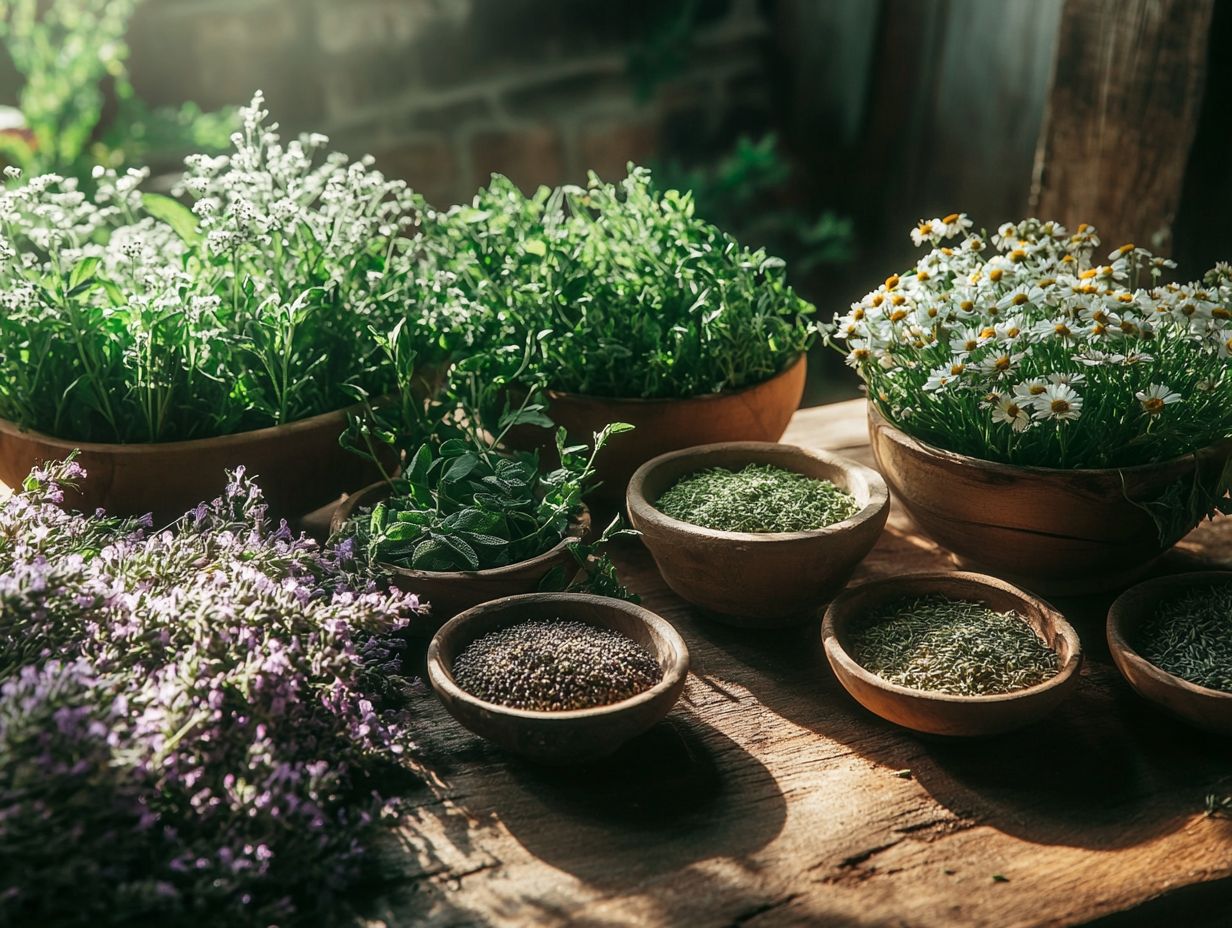
Rhodiola Rosea, a remarkable herbal supplement, is capturing your attention for its ability to lower stress hormone levels and enhance mental health. Many people use it alongside cognitive behavioral therapy to effectively manage anxiety disorders.
This herb is packed with bioactive compounds, including rosavin and salidroside, which are thought to bolster your resilience to stress by regulating neurotransmitter levels and promoting an overall sense of well-being. Research shows that Rhodiola can really help reduce anxiety symptoms while simultaneously improving your focus and mood during stressful times. To enhance your relaxation further, consider exploring the 5 best herbs for calming herbal teas.
A noteworthy study published in the journal ‘Phytomedicine’ underscored its effectiveness in reducing anxiety and enhancing cognitive function in adults. However, it s important to be mindful of potential safety concerns, such as interactions with certain medications and possible side effects like irritability or insomnia if taken in excessive amounts.
Therefore, consulting with a healthcare provider is advisable before embarking on any new supplement regimen.
8. Holy Basil
Holy Basil is a powerful herb known for its great emotional support. If you re looking for a natural way to relieve stress, this herb may be just what you need!
Its active compounds, including eugenol and rosmarinic acid, are recognized for their anti-inflammatory benefits and adaptogenic properties. These ingredients work together to help balance your body s stress response, while also promoting mental clarity and emotional resilience.
Research suggests that Holy Basil can enhance your mood and cognitive function, contributing to your overall wellness. However, it s important to remember that, like any herbal supplement, it may have side effects, such as gastrointestinal discomfort or interactions with medications like blood thinners.
Don’t wait! Be sure to consult a healthcare professional before adding this remarkable herb to your routine.
9. Kava
Kava is an herbal supplement famous for its calming effects. It’s a popular choice for tackling anxiety, but remember to consider safety concerns when thinking about its use alongside cognitive behavioral therapy.
This herb contains active ingredients called kavalactones, which are believed to foster relaxation and alleviate stress. For those seeking natural remedies, herbal tea for stress relief can be a great option. Research supports Kava’s effectiveness, showing it can significantly reduce anxiety symptoms without the sedative effects often linked to pharmaceutical options.
However, potential side effects, including liver toxicity, are crucial to consider, especially regarding interactions with medications like antidepressants or sedatives. So, use Kava carefully for your safety!
10. St. John’s Wort
St. John’s Wort is a well-known remedy for anxiety. Many studies highlight its effectiveness in improving mood and reducing symptoms of anxiety and depression.
This herb contains active compounds like hypericin and hyperforin, which are thought to influence serotonin levels in your brain. Several clinical trials have shown that these components may alleviate anxiety symptoms. A meta-analysis indicates that St. John’s Wort can outperform placebo treatments, making it a compelling alternative for certain patients.
However, you should consider potential side effects like gastrointestinal upset, fatigue, and increased sensitivity to sunlight. Interactions with conventional medications, especially antidepressants and anticoagulants, are also a concern. Consulting healthcare professionals is vital for making informed decisions about your treatment options.
11. Ginseng
Ginseng is a highly regarded herb that can enhance your emotional well-being. It’s a great option for those looking to relieve anxiety symptoms.
There are various types, such as American ginseng (Panax quinquefolius) and Asian ginseng (Panax ginseng), each offering unique active compounds with specific benefits. American ginseng is known for its calming effects, making it great for stress relief. In contrast, Asian ginseng is linked to increased energy and improved cognitive function.
To ensure you’re getting quality, advanced testing methods like high-performance liquid chromatography (HPLC) verify that ginseng products contain essential active ingredients, such as ginsenosides. Numerous studies have corroborated these benefits, demonstrating significant effects on reducing fatigue and enhancing mental clarity. This highlights the importance of choosing high-quality ginseng supplements for optimal results.
12. Ginkgo Biloba
Ginkgo Biloba stands out as a remarkable herbal supplement often highlighted for its potential mental health benefits. It may be particularly valuable for alleviating anxiety disorders and enhancing cognitive function.
The active components within Ginkgo, especially flavonoids and terpenoids, are thought to improve blood circulation in the brain. This can lead to sharper mental clarity and better memory. Research shows that these compounds might protect neurons from age-related damage and oxidative stress.
Numerous studies have explored Ginkgo Biloba s potential in reducing anxiety symptoms, with several trials yielding encouraging results. However, always prioritize your safety consult a healthcare provider before beginning Ginkgo supplementation, especially if you re taking blood thinners or other medications, as Ginkgo could raise the risk of bleeding.
It s advisable to ensure it aligns with your individual health needs and is both safe and effective.
13. Skullcap
Skullcap, though perhaps not the most familiar herbal remedy, is increasingly recognized as a compelling option for treating anxiety disorders. It is celebrated for its calming effects and the variety of treatment methods it offers.
This remarkable plant has been employed in traditional medicine for centuries, often paired with other herbs to enhance its effectiveness. The active ingredients in skullcap primarily flavonoids and phenolic acids are believed to contribute significantly to its soothing properties.
Users frequently report a marked reduction in feelings of anxiety, making this herb an intriguing alternative for those seeking natural solutions. For those specifically looking for relief, herbal tea for menstrual relief can be a great option. However, it’s crucial to remain mindful of potential safety concerns; side effects such as drowsiness or an upset stomach may affect some individuals. Therefore, consulting a healthcare professional before embarking on any new herbal regimen is wise.
14. Gotu Kola
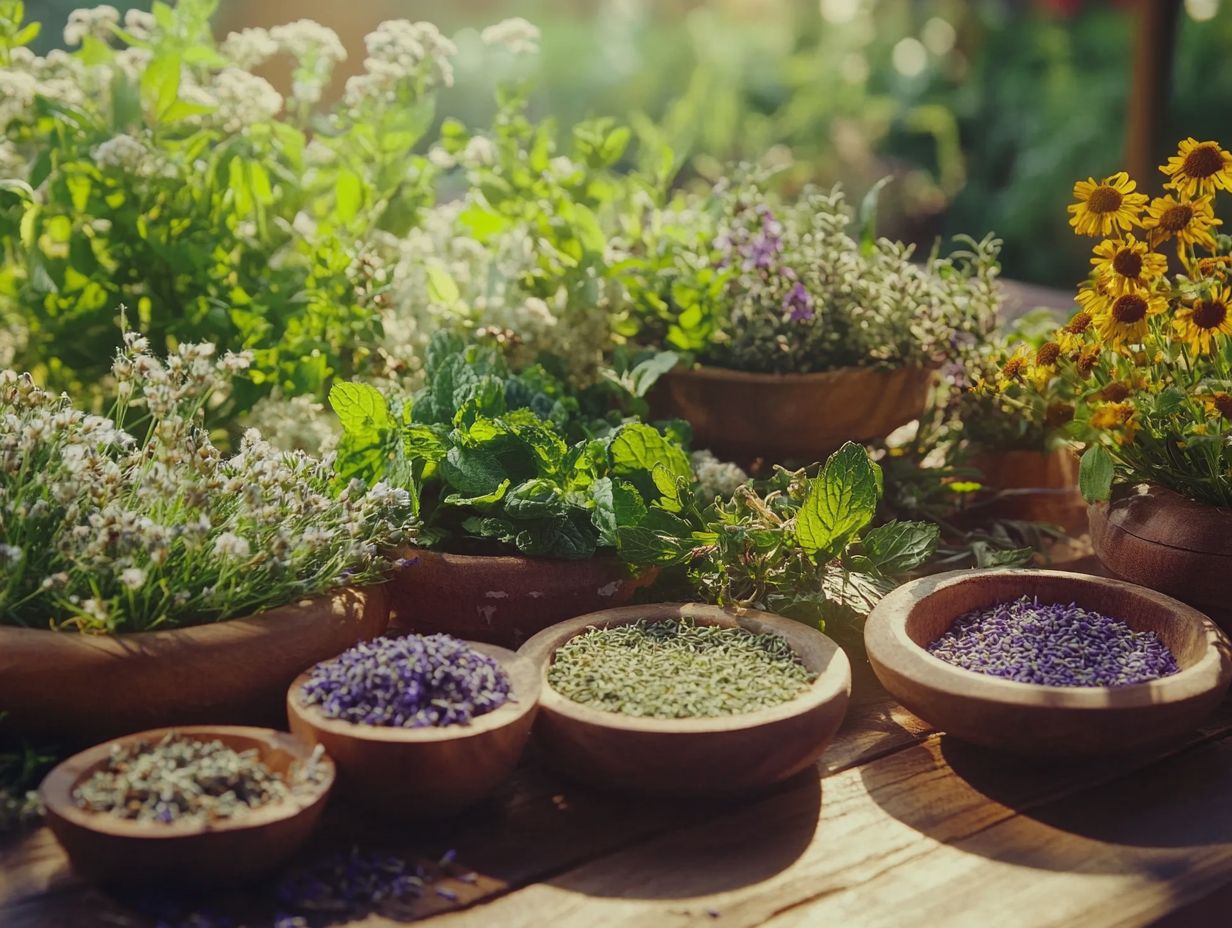
Gotu Kola is a highly regarded herbal supplement that offers numerous benefits for mental health. This makes it an appealing natural alternative for anyone seeking relief from anxiety disorders.
Its key active compounds asiaticoside, madecassoside, and rutin boast neuroprotective properties that could enhance cognitive function and stabilize mood. Recent studies suggest that these ingredients may help reduce anxiety and improve overall emotional well-being, indicating a promising role in managing mental health issues.
However, it’s wise to proceed with caution. Some research points to potential side effects, such as digestive discomfort or skin reactions. Gotu Kola may also interact with certain medications, particularly sedatives. This emphasizes the need to consult with a healthcare expert before use.
15. Reishi Mushroom
Reishi Mushroom is a remarkable herbal supplement known for providing emotional support and easing anxiety symptoms. Many people find it beneficial when used alongside cognitive behavioral therapy, enhancing overall mental well-being.
Research shows that its bioactive compounds, particularly triterpenes and polysaccharides, may play a vital role in modulating mood and alleviating stress. This has made it a focal point in various studies exploring its effectiveness in promoting emotional health.
One study, in particular, found that participants reported lower anxiety levels after incorporating Reishi into their daily routine for several weeks. However, it s crucial to be mindful of safety considerations. While Reishi is generally regarded as safe, some individuals might encounter side effects like digestive discomfort or allergic reactions.
If you’re considering adding Reishi to your regimen, it’s wise to consult a healthcare professional first.
What Is Stress and How Does It Affect the Body?
Stress is your body’s natural response to challenges. It can greatly affect your mental health, particularly if you have anxiety disorders.
When stress hormones rise, you may face cognitive and emotional challenges. Interventions like talk therapy can help you manage these effects.
Physiological effects may include a fast heart rate, muscle tension, and a weakened immune response. These can worsen existing mental health issues.
Chronic stress creates a cycle of anxiety where worry dominates your thoughts. Effective coping strategies are essential to break this cycle.
Talk therapy can be a valuable resource. It helps you recognize and change negative thought patterns, leading to healthier coping methods.
How Can Herbs Help with Stress Relief?
Herbs can play a vital role in your journey toward stress relief. They offer various remedies designed to target anxiety symptoms and provide natural alternatives to conventional treatments.
Take adaptogens, for example. Ashwagandha and rhodiola rosea are known for their ability to help your body adapt to stress by regulating cortisol levels.
Studies support that ashwagandha can significantly reduce anxiety in those dealing with chronic stress. Rhodiola may enhance both physical and mental resilience.
To incorporate these herbs into your daily routine, consider these treatment options:
- Add ashwagandha powder to your morning smoothies for a nourishing start, combined with other dietary supplements for better effect.
- Opt for rhodiola capsules as an afternoon energy lift, which can be a great part of your wellness regimen.
You might enjoy sipping chamomile or lemon balm tea. Both are renowned for their calming properties and can transform your evening into a relaxing retreat.
This simple ritual promotes restorative sleep and enhances your overall well-being.
What Are the Different Forms of Herbal Remedies for Stress Relief?
You have various herbal remedies at your disposal for stress relief, including teas, tinctures, capsules, and extracts. Each option offers unique benefits and potential side effects to consider.
For example, herbal teas can provide a gentle calming effect. Tinctures deliver a more concentrated dose, perfect for those seeking quick results.
If you’re often on the go, capsules offer a convenient solution. Extracts can be easily added to your favorite foods or drinks, giving you flexibility in usage.
Understanding how each remedy is prepared is essential. Teas typically involve steeping herbs in hot water, while tinctures require soaking herbs in alcohol or vinegar to extract beneficial compounds.
It’s vital to keep safety in mind. Herbs can interact with prescription medications or trigger allergic reactions. Choosing products from reputable suppliers with quality testing is crucial.
This way, you can enjoy the benefits of herbal remedies without undue risk.
How Can One Incorporate Herbs into Their Daily Routine for Stress Relief?
Incorporating herbs into your daily routine can be an effective way to manage stress and anxiety. You can enjoy the benefits of wellness supplements seamlessly.
Consider adding chamomile or lemon balm to your evening teas. You can also sprinkle fresh basil and oregano into your meals to enhance both flavor and health. Experimenting with essential oils, which are concentrated extracts from plants, or herbal tinctures, which are liquid extracts from herbs, can create inviting atmospheres that promote relaxation. Including herbs like Valerian and Kava can further enhance your relaxation. For more ideas, check out the top 5 DIY herbal remedies for stress relief. Being consistent with these practices is crucial; over time, you may notice improvements.
Keeping a journal to track your experiences and any changes in mood or well-being is helpful. This tailored approach to stress management aligns with your personal needs and aids in recognizing mental health conditions.
Are There Any Risks or Side Effects with Using Herbal Remedies for Stress Relief?
While herbal remedies can provide stress relief, it s important to be aware of the risks and potential side effects. Discussing with a healthcare professional is essential for safe usage.
Some herbs may interact negatively with prescription medications or worsen existing health conditions. For example, St. John’s Wort can interfere with antidepressants. Other herbs might cause digestive issues or allergic reactions. Just because something is natural doesn’t mean it s safe.
Consulting a healthcare professional helps you navigate these complexities. This way, you can take a balanced approach that considers your personal health history and any ongoing treatments, especially if you are exploring various natural alternatives.
Frequently Asked Questions
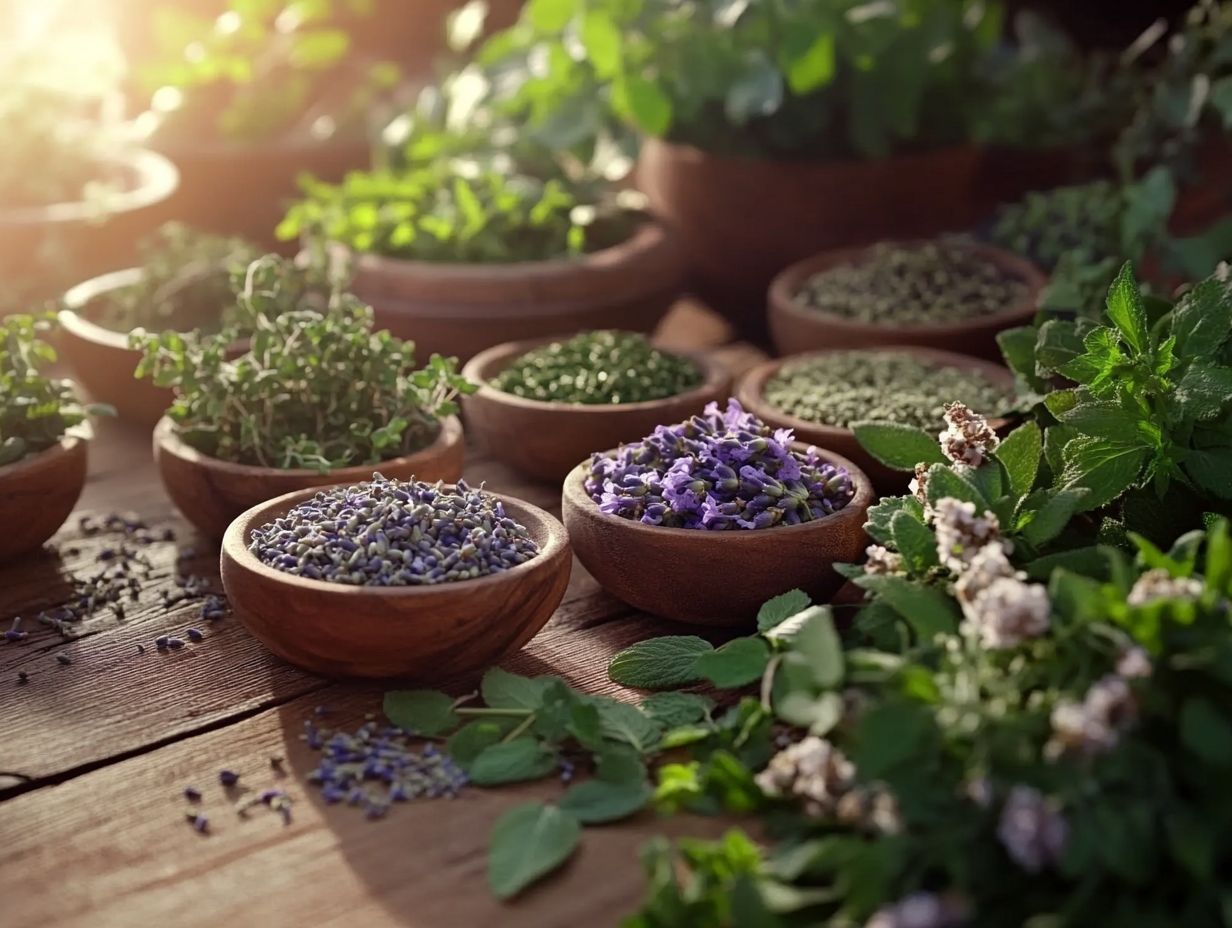
What are the top herbs for stress relief?
The top herbs for stress relief include ashwagandha, passionflower, chamomile, and lemon balm, alongside Rhodiola and Valerian.
How can ashwagandha help with stress relief?
Ashwagandha is a herb that helps the body adapt to stress and promotes calm, especially for those with anxiety.
What is passionflower and how does it benefit stress relief?
Passionflower acts as a natural sedative, helping reduce anxiety and promoting relaxation, making it a great choice for those facing mental health issues.
Can chamomile really help with stress relief?
Yes, chamomile has been used for centuries as a natural remedy for stress and anxiety due to its calming properties. It s often recommended by healthcare professionals.
What are the benefits of using lemon balm for stress relief?
Lemon balm has a calming effect on the nervous system and can improve sleep quality, making it a great herb for stress relief. It’s often combined with other herbal remedies.
Are there any potential side effects of using herbs for stress relief?
While herbs are generally safe, consulting with a healthcare professional before use is important, especially regarding potential medication interactions if you are pregnant, nursing, or taking any medications.
Try incorporating these herbs into your routine today for a calmer tomorrow!

